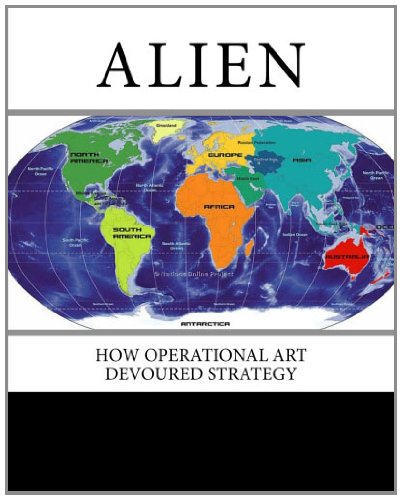Artículos relacionados a Alien: How Operational Art Devoured Strategy

There was a time when the world had no need for operational art, a time when sovereigns led their armies in the field and where the yoking of war to politics was their personal undertaking. It was the sovereign who chose whether or not to fight, where to fight, how long to fight, and it was they who were constantly balancing opportunities and threats, risks and returns, costs and benefits. In the era of “strategies of a single point,” the connections between tactics and statecraft were immediate and intimate. As modern states emerged, their economic and social organization enabled them to deploy and sustain armies of ever increasing size. Big armies needed more space, and the theater of operations grew along with them. This increasingly removed the actions of those armies from the direct scrutiny of the sovereign, and the connection between war and politics became unacceptably stretched. The idea of the campaign was expanded to redress this widening gap, and it gained a geographic meaning in addition to its traditional temporal one. The campaign became the pursuit of the war’s objectives by an independent commander acting beyond the immediate scrutiny of his sovereign. The framework provided by the campaign objectives, geographic boundaries, resources, and other guidance provided by the sovereign determined the freedom of action available to the campaign commander. Within those freedoms, he was able to sequence battles as he thought necessary in order to achieve the objectives that had been provided to him. Most likely a number of tactical action sequences connected by a unifying idea, i.e., “operations,” each directed at somehow setting the conditions for the next step, would be necessary. The cascading hierarchy of objectives—political, strategic, campaign, operational, and tactical reconnected tactical action to the political purposes of the war. These thoughts had emerged by the late-19th century and were further developed and adorned as the experience of total war grew through World Wars I and II. Although they had been a part of U.S. doctrine until after World War I, they disappeared for awhile, and it was not until the 1982 version of U.S. Army Field Manual (FM) 100-5 that these ideas were reintroduced, although in a different form. Rather than meeting its original purpose of contributing to the attainment of campaign objectives laid down by strategy, operational art—practiced as a “level of war”— assumed responsibility for campaign planning. This reduced political leadership to the role of “strategic sponsors,” quite specifically widening the gap between politics and warfare. The result has been a well-demonstrated ability to win battles that have not always contributed to strategic success, producing “a way of battle rather than a way of war.” The political leadership of a country cannot simply set objectives for a war, provide the requisite materiel, then stand back and await victory. Nor should the nation or its military be seduced by this prospect. Politicians should be involved in the minute-to-minute conduct of war; as Clausewitz reminds us, political considerations are “influential in the planning of war, of the campaign, and often even of the battle.” As war continues to diffuse across definitional and conceptual boundaries and as enemies seek ways to exploit democracy’s vulnerabilities, closing the gap between politics and the conduct of war is becoming ever more important. It is time we returned what we now call campaign design to the political and strategic leadership of the country and returned operational art to its original venue, where it was overwhelmingly concerned with tactics.
"Sinopsis" puede pertenecer a otra edición de este libro.
- EditorialCreateSpace Independent Publishing Platform
- Año de publicación2009
- ISBN 10 1461107687
- ISBN 13 9781461107682
- EncuadernaciónPaperback
- Número de páginas130
- Valoración
(Ningún ejemplar disponible)
Buscar: Crear una peticiónSi conoce el autor y el título del libro pero no lo encuentra en IberLibro, nosotros podemos buscarlo por usted e informarle por e-mail en cuanto el libro esté disponible en nuestras páginas web.
Crear una petición
